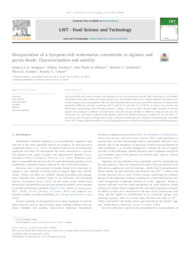Encapsulation of a lycopene-rich watermelon concentrate in alginate and pectin beads: Characterization and stability.
Encapsulation of a lycopene-rich watermelon concentrate in alginate and pectin beads: Characterization and stability.
Author(s): SAMPAIO, G. L. A.; PACHECO, S.; RIBEIRO, A. P. de O.; GALDEANO, M. C.; GOMES, F. dos S.; TONON, R. V.
Summary: The aim of this work was to evaluate the influence of the type of polymer and the effect of drying on the stability of lycopene-rich beads obtained by ionic gelation of a watermelon concentrate. Sodium alginate and pectin were used as polymers for encapsulation. The wet and the dried beads were characterized for lycopene retention when exposed to different thermal treatments (60 °C and 90 °C) and pHs (2, 5 and 8), as well as for particle size distribution, morphology and thermogravimetric analysis. All the particles showed high lycopene protection against the evaluated conditions of temperature and pH. Storage stability at different temperatures was also evaluated. The wet beads produced with alginate and pectin showed lycopene retention of 29 and 21%, respectively, after 8 weeks of refrigerated storage, while the dried beads were showed retentions higher than 80% above 25 °C. Ionic gelation showed to be a promising alternative to obtain stable lycopene-rich dried ingredients.
Publication year: 2019
Types of publication: Journal article
Unit: Embrapa Food Technology
Keywords: Ionic gelation, Lycopene, Physical properties, Polysaccharides, Stability
Observation
Some of Embrapa's publications are published as ePub files. To read them, use or download one of the following free software options to your computer or mobile device. Android: Google Play Books; IOS: iBooks; Windows and Linux: Calibre.
Access other publications
Access the Agricultural Research Database (BDPA) to consult Embrapa's full library collection and records.
Visit Embrapa Bookstore to purchase books and other publications sold by Embrapa.

